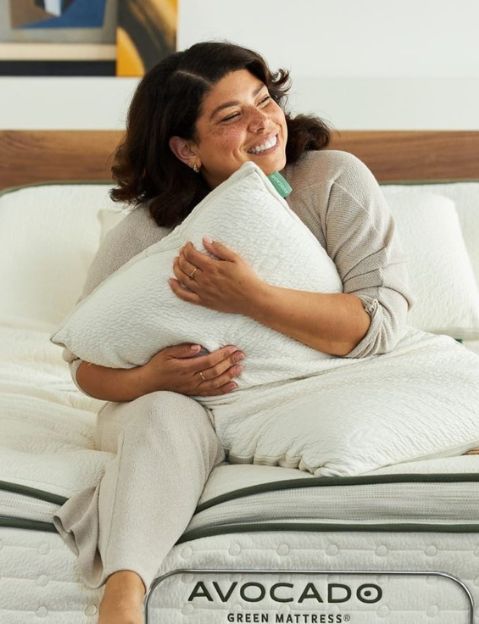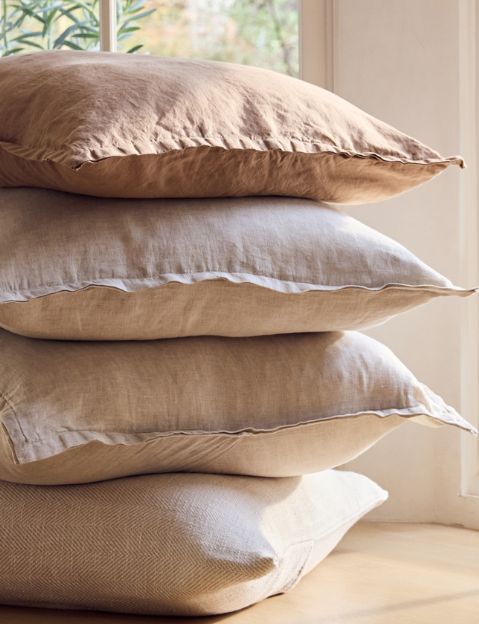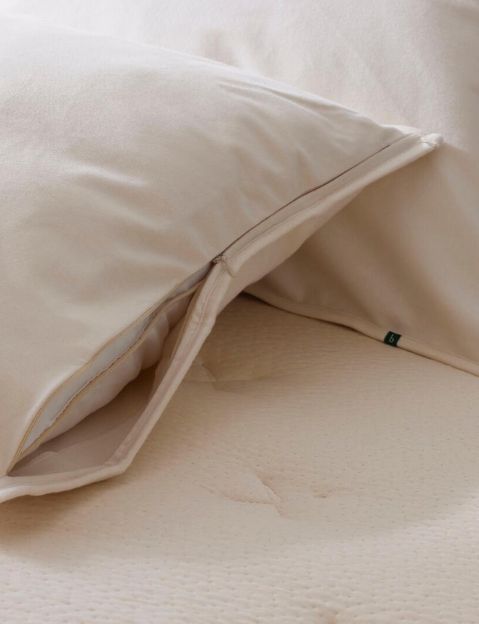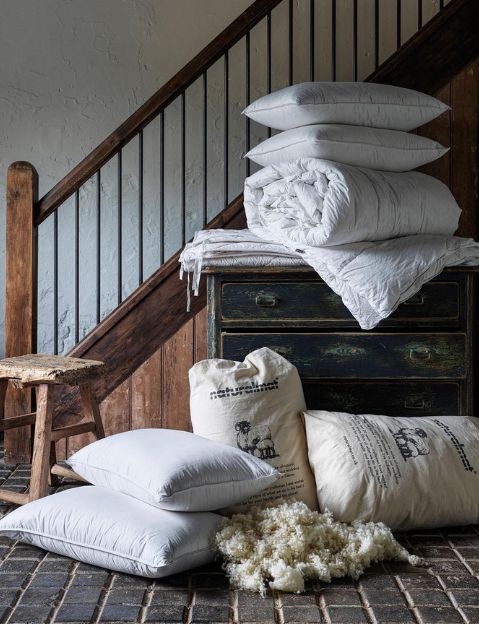Last Updated on September 25, 2024
Ideally, we sleep for 8 hours every night. That’s ~240 hours a month we’re pressing our heads into our pillows.
What you sleep on matters – including what kind of pillow you’re using. Many conventional pillows are made out of synthetic materials, like polyester. This can be problematic for numerous reasons.

Some of the links in this post are affiliate links; for more information please see my disclosure policy.
For starters, polyester doesn’t breath well. This fabric doesn’t regulate body temperature or absorb moisture well, leaving you feeling too hot or too cold.
Additionally, synthetic pillows shed microplastics over time after wear and tear. Plus, there’s little to no recycling options, so it will likely end up in a landfill.
But perhaps most important is our health: Synthetic materials like polyester can contain carcinogens that may cause skin, lung, and heart cancer, as well as respiratory issues. Polyester can also make existing skin problems worse, such as rashes, itching, redness, eczema, and dermatitis.
If you’re looking to switch to organic pillows, made with natural materials, here are some from brands I recommend.

what is the healthiest type of pillow?
The healthiest type of pillow is one that contains little to no synthetic materials. Synthetic materials, like polyester and memory foam pillows, can do something called off-gassing.
This is when newly manufactured products release volatile organic compounds (VOCs) and other harmful chemicals into the air after being unwrapped.
This happens because the products absorb gaseous chemicals during production and then release them in the home. You will often smell it right away, but the fumes can linger for months or even years after the smell reduces.
Ethylene glycol is the chemical found in polyester pillows that causes them to off-gas. Memory foam is just another name for polyurethane (PU), which can release volatile organic compounds (VOCs).
When you sleep on these pillows, you can inhale these chemicals. They can also be absorbed through the skin and can cause a multitude of problems, such as skin and eye irritation, damage to the nervous system and kidneys and respiratory irritation.
On top of this, polyester is also attractive to dust mites, as there are many places the bugs can hide. Their feces can worsen allergy symptoms.
Instead, the healthiest pillow is one made from organic, natural materials, like cotton and natural latex. Organic cotton is pesticide-free and natural latex inhibits growth of mold or mildew all while regulating heat and circulating air.

are organic pillows worth it?
Yes, organic pillows are worth it for your health, wallet and the environment. That’s because organic pillows are made from high-quality ingredients that won’t degrade as quickly as synthetic materials.
Several brands also offer various different styles of organic pillows to fit your needs. For example, Avocado Mattress (listed below) offers four different styles of pillow and even has a pillow-finder quiz to help you make the best choice based on your preferences and needs.
So, you will not only be getting higher quality ingredients, but better designs and support to meet your needs.
Upfront organic pillows may be pricier, but over time they will pay for themselves because they are designed to last.
what makes a pillow organic?
What makes a pillow organic is if it’s made using certified organic materials. Organic pillows tend to be made using natural materials for both the shell and the filling.
The fill can be shredded latex, cotton, wool, silk, kapok fibers, down, feathers (from geese or ducks), or buckwheat hulls. Not all these options are vegan, so make sure to inspect the materials used carefully before making your selection. Many brands create organic vegan pillows as well.
gzw approved organic pillows
Here are some brands that sell organic pillows and get the Going Zero Waste seal of approval. Most of these brands also sell sustainable bedding options like mattresses and/or sheets. Many offer vegan options.
I’ve gone ahead and highlighted some key features of each brand, but it isn’t an exhaustive list. Be sure to check out their websites for more information.

1. avocado mattress
- 4 main styles of pillows + mini and toddler pillows
- GOLS Certified organic latex & cotton
- GOTS Certified organic kapok fill
- Adjustable fill for extra support and comfort
- Vegan options
- B Corp certified

2. coyuchi
- Organic latex + down pillow inserts
- GOLS Certified organic Dunlop latex
- GOTS Certified organic cotton shell
- 1% of every order donated to nonprofit you choose
- Comes in a reusable cloth bag
- Vegan options
- Option to shop pre-loved
- Take-back program

3. birch
- Organic pillows in standard + king size
- GOTS + eco-INSTITUT certified, featuring Fair Trade cotton covers
- Fill is organic, cruelty-free wool + natural latex
- Greenguard GOLD certification
- No polyurethane-based foams
- 100 night trial for all products
- 1 year warranty

4. naturepedic
- 7 main kinds of pillows + kid pillows
- Made with certified organic cotton, GOTS-approved latex, + plant-based PLA batting
- Their entire factory is GOTS certified organic
- Greenguard + Made Safe Certified
- Vegan options
- 100 night trial
- 1 year warranty

5. sol organic
- Organic down pillow
- Made with 100% organic certified cotton shell + responsibly sourced down
- Choose between soft, medium, + firm
- Standard + king size options

6. naturalmat
- 8 main styles of pillows
- UK-based, handmade in their Devon workshop
- Made from OEKO TEX 100 certified 100% cotton cambric cover
- Filled with organic wool or feathers + down (responsibly sourced without any harm to living animals)
- Packaged in a reusable cotton drawstring bag
Which of these organic pillows would you like to try? Let me know in the comments!



